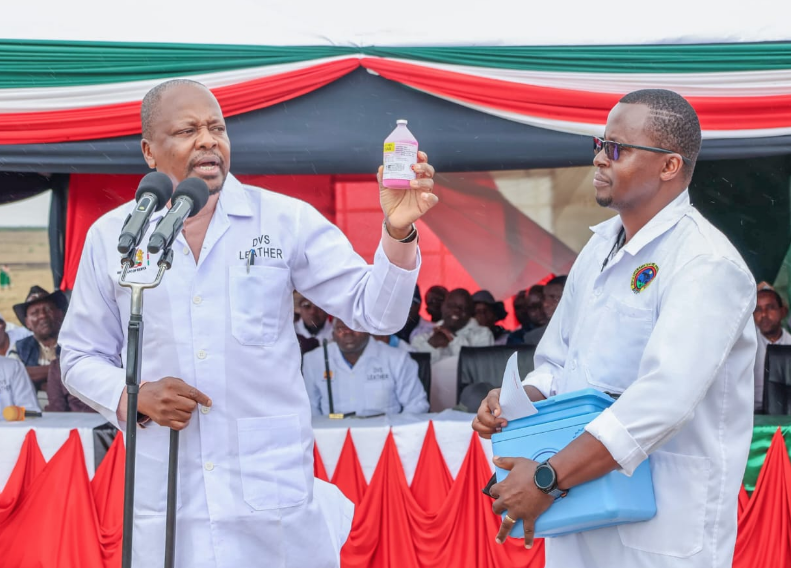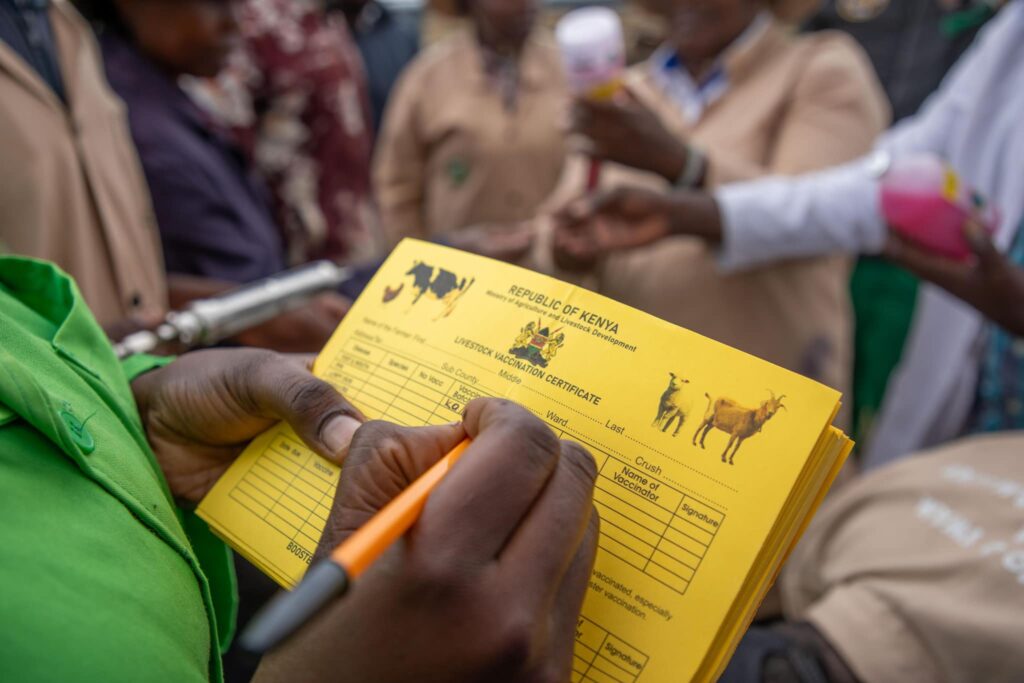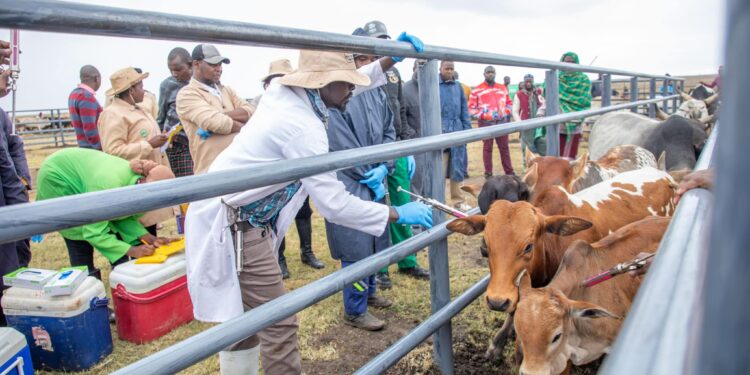Kenya is taking a decisive step toward ensuring its livestock products dominate global markets by launching a nationwide livestock vaccination program. The initiative, led by the Ministry of Agriculture and Livestock Development under a presidential directive, aims to safeguard livestock health, enhance productivity, and expand market opportunities for Kenyan meat products. With a focus on combating diseases such as foot-and-mouth disease in cattle and peste des petits ruminants (PPR) in goats and sheep, this campaign is expected to transform the livestock sector and reinforce Kenya’s position as a top meat exporter.
The vaccination exercise, which targets at least 22 million cattle and 50 million goats and sheep over three years, is being rolled out across the country. The government has assured farmers of the vaccines’ safety and effectiveness, emphasizing that the initiative is for their own benefit. Cabinet Secretary for Health Mutahi Kagwe dismissed misinformation surrounding the vaccination, stating that leaders with genuine expertise would not endorse a harmful program. He equated the current skepticism to the earlier resistance against COVID-19 vaccinations, calling it a result of misinformation and lack of knowledge.

While participation in the program remains voluntary, the government is actively encouraging livestock farmers to take advantage of the initiative. National Government Administration Officers (NGAOs) are leading grassroots mobilization efforts, educating communities on the benefits of vaccination, and ensuring that the campaign reaches even the most remote areas. Their involvement underscores the government’s commitment to improving the livestock sector while strengthening the country’s economy.
The vaccination will not only improve the health of livestock but also enhance production, quality, and population, effectively reversing the annual economic losses of up to Sh62 billion caused by market closures, both locally and internationally, high treatment costs, and the staggering 70 percent losses due to high mortality rates,” CS Kagwe stated. He further emphasized that Kenya has already signed trade agreements with the United Arab Emirates and the European Union (EU), whose economies boast a GDP of USD 850 billion and 17 trillion euros, respectively. “These are lucrative markets that Kenya stands to lose due to the presence of these diseases, which the vaccination program seeks to address,” he explained. In Laikipia County, where cattle are actively being vaccinated, the government is making strategic interventions to secure these export markets and ensure that Kenya’s livestock sector remains globally competitive.
Deputy President Kithure Kindiki has stressed the critical role livestock plays in Kenya’s economy, pointing out that the country has the third-largest livestock population in Africa, following Sudan and Somalia. He highlighted the need to protect Kenya’s 22 million cattle and 50 million small stocks (goats and sheep) from preventable diseases to maximize farmers’ profits and secure international market access. “We must vaccinate all our livestock to help create wealth and get maximum returns for our herders and livestock keepers,” he said.
To ensure long-term sustainability, the government is treating livestock farming with the same urgency and investment as crop farming. CS Kagwe reaffirmed this commitment, stating, “We will give as much attention to livestock as we’ve done to crops. Our goal is to improve farmers’ income as a philosophy. My job is to make sure every farmer has enough money.” This approach signals a strategic shift in agricultural policy, focusing on comprehensive support for livestock farmers.

Despite these efforts, the vaccination program has faced resistance fueled by conspiracy theories. Some claim that Microsoft co-founder Bill Gates is financing the initiative, suggesting the vaccines could alter livestock genetics and produce defective animals. However, experts have refuted these allegations. Prof. Gulie, Advisor to the President on Livestock, assured farmers that the vaccines are routine and scientifically proven. “This is a normal vaccine, like what we have been doing since childhood. I urge all livestock farmers to vaccinate their animals and not listen to propagandists,” he said.
The government maintains that without proper disease control, Kenya risks losing valuable market opportunities abroad. DP Kindiki emphasized the importance of meeting international health standards for meat and dairy exports. “We have great market openings abroad, but we cannot export our meat and milk products if our animals have disease doubts. Vaccination will resolve this problem absolutely,” he stated. This highlights the direct link between disease-free livestock and Kenya’s ability to access lucrative foreign markets.
In Laikipia County, the campaign aims to vaccinate 1.1 million livestock, including 300,000 cattle and 800,000 goats and sheep. Similar efforts are being replicated across the country, reflecting the government’s aggressive push to improve livestock health and increase Kenya’s export competitiveness. By systematically eradicating major livestock diseases, Kenya is positioning itself as a reliable global supplier of high-quality meat and dairy products.
The success of this vaccination drive will not only benefit farmers but also boost Kenya’s economy through increased exports. Healthy livestock mean higher productivity, better market prices, and strengthened trade relations with global partners. As Kenya intensifies its disease control efforts, it is paving the way for a more prosperous livestock sector that contributes significantly to the national GDP.
Ultimately, this initiative is a game-changer for Kenya’s agricultural landscape. By ensuring disease-free livestock, the government is unlocking new economic opportunities and reinforcing its commitment to food security, trade expansion, and farmer prosperity. With consistent efforts, Kenya’s meat industry is poised for unprecedented growth, securing a dominant place in the global market.













